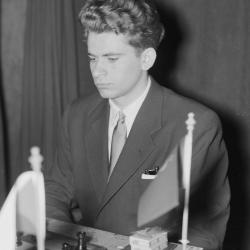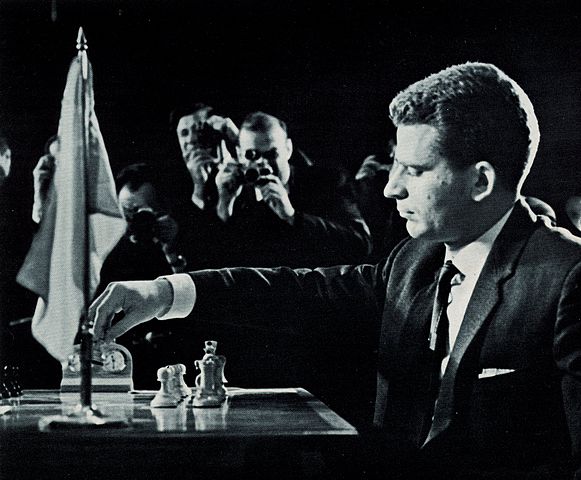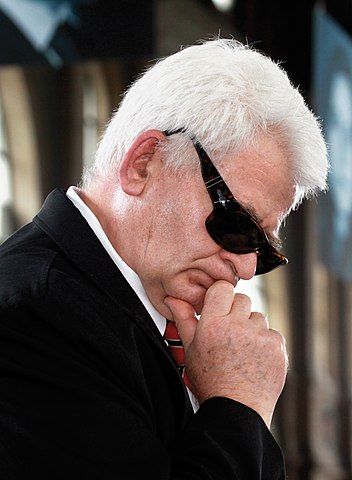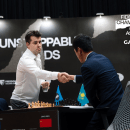GM Boris Spassky

Bio
Boris Spassky was born in St. Petersburg, Russia (then Leningrad, Soviet Union) on Jan. 30, 1937 and became the 10th official world chess champion in 1969. He was (and is) known in chessdom for his universal playing style, comfortable in any position. He became an internationally known figure during his 1972 title bout with the American Bobby Fischer, but it would be a mistake to remember him only for losing that match.
Teenage Candidate
Spassky’s chess promise showed from a quite young age, and by 1955 he was already a top player in the world, winning the World Junior Championship and qualifying for the 1957 world championship cycle. With a +7 -5 =8 score in the 1955 Interzonal, he earned a spot in the Candidates tournament. Spassky finished with a respectable +3 -2 =13 in the 10-player double round-robin, but Vassily Smyslov cleared the field with six wins and just one loss. The loss: to Spassky.
Lull
Unfortunately, Spassky would not qualify for the Candidates again (or even an Interzonal) until the 1966 cycle. Arguably his main accomplishment in the meantime: winning with the King’s Gambit, twice, in one year. He finished in the middle of the pack in the 1960 Soviet Championship but defeated David Bronstein with a sacrificial onslaught that would later be used in the James Bond film From Russia With Love.
Two months later at Mar del Plata, Argentina, Spassky faced a young American player for the first but not last time in their careers. His name, of course, was Bobby Fischer. In a game that would inspire Fischer to declare the King’s Gambit a loss for White (after his new move, 3...d6) a year later, Spassky simply outplayed him. Despite the decisive result between them, they shared the victory at Mar del Plata, Spassky finishing +12 =3 and Fischer +13 -1 =1.
Candidate Again
In 1964 Spassky finally qualified for the Interzonal tournament again. He was one of four players to score 17 out of 23 (doing so +13 -2 =8), tying for first and qualifying for the 1965 Candidates. There he defeated Paul Keres 6-4 and Efim Geller 5½-2½ to advance to the finals against former champion Mikhail Tal.
Tal struck first with a victory in the second game, but Spassky immediately bounced back with a win in game three. Five draws followed before Spassky opened the floodgates with three straight wins to claim his spot in the championship match against Tigran Petrosian. Interestingly, of the five decisive games, Black won four, including Spassky in the game 11 clincher.
Spassky fell behind Petrosian two wins to zero after 10 games but responded with wins in games 13 and 19 to tie the match with only five games to play. But the very next game went against him, and another loss in game 22 allowed Petrosian to repeat as champion.
Spassky nonetheless received a bid into the 1968 Candidates. There he defeated Geller again, followed by a win over Denmark's Bent Larsen. Spassky was then met in the final round by Viktor Korchnoi, who had defeated Tal the round before.
Spassky jumped into the lead after two games and then won game four as well. Korchnoi threatened to get back into the match with a game-six win, but Spassky put a stop to that by winning the next two games. Two more draws gave Spassky his rematch with Petrosian.
Champion
Spassky immediately dropped game one to Petrosian, but he was not about to roll over, tying the match in game four, taking the lead in game five, and expanding his lead in game eight. But Petrosian was no pushover either, of course, and after game 11 the match was again tied.
Perhaps six decisive games out of the first 11 was too much for both of them, as the next five were drawn, including short bouts in Spassky’s two as White. Spassky’s next game as White, however, the 17th of the match, was a victory for him. Then, in game 19, he crushed Petrosian in 24 moves to again open a two-point lead.
But the back-and-forth of the match continued with Petrosian claiming victory in game 20. Spassky would not allow him to tie the match again, however, and immediately reopened his two-point lead with a game-21 victory. Spassky now needed just two draws in the final three games to claim the title of world champion. He got them in the next two contests, thus becoming the 10th official chess world champion.

Perhaps the most famous game of Spassky’s career came during his championship reign in 1970, when he sacrificed a rook and won as Black in just 17 moves against the Larsen and the Danish star's signature opening move (1.b3).
Spassky had the misfortune, of course, of defending his title against Fischer at the peak of the latter’s powers in 1972. Spassky would win three games, including the first two (one by forfeit) but ultimately came well short of a successful defense. Fischer won in 21 games.
Post-Championship Career
In the 1975 championship cycle, Spassky once again had to face a younger player near his peak. After defeating Robert Byrne in the Candidates quarterfinal, Spassky was matched with Anatoly Karpov in the semifinal. Spassky won the first game, but Karpov won game three and then took the lead with a game-six win. Karpov also took games nine and 11, and Spassky’s chance to play in a fourth consecutive world championship match ended.
Spassky reached the Candidates final yet again in the 1978 cycle but this time fell to Korchnoi. In the next Candidates match, he did not make it out of the quarterfinal, and that was his last time reaching that stage.
Spassky’s last major chess event was his 1992 rematch with Bobby Fischer. The match understandably received copious media attention, but because Fischer had not played seriously in 20 years and Spassky was past his prime, no one took seriously the stated status of the match as a championship clash. Spassky won five games, but Fischer reached the 10-win threshold for match victory after 30 games.
Spassky continued to play regularly until about 2002 and played a match with Korchnoi as late as 2009. (Each player won twice in the drawn eight-game match.) Spassky, who became a French citizen in 1978, returned to Russia in 2012 and remains there today.

Legacy
Because he played Fischer in 1972, Spassky is one of the well-known chess players among those outside the chess world, especially in the United States.
Inside the chess world, Spassky is remembered as a “universal” player, equally adept at attack and defense and at play in any stage of the game. He won several brilliancies, as seen in the games above.
It is his ability at a chessboard, not the geopolitics of the 1972 world championship match, for which Spassky ought to be remembered.


